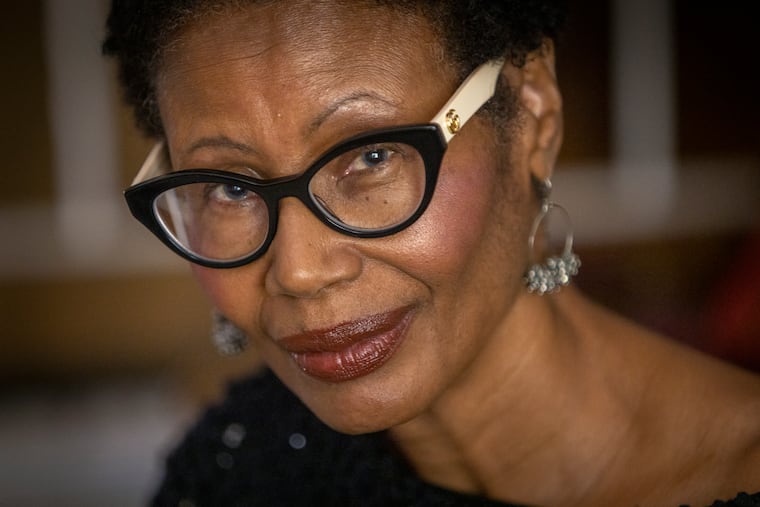Philadelphia novelist Diane McKinney-Whetstone shows life after 60 is fun in ‘Our Gen’
When it came time to write "Our Gen," McKinney-Whetstone said it was time for levity. She will sign copies at the Lightbulb Learning Center in Overbrook on Oct. 23

In Our Gen, Diane McKinney-Whetstone’s latest novel, a group of friends have casual sex, keep secrets, and smoke a lot of weed. But they aren’t millennials, they live in an active 55+ community in townhomes with smart appliances. They laugh a lot and always have time for a good time.
“When I started thinking about writing about the 55+ active community, I wanted to put all of the things I would have wanted in my home that would be fun: floor-to-ceiling windows, security systems with facial recognition technology, all of the things.”
This, McKinney-Whetstone’s seventh book, is a change for the award-winning Philadelphia writer. Her previous works, that include her first novel, Tumbling, were intense stories about young Black women whose lives were upended by racism, unintended pregnancies, and mental illness.
When it came time to write Our Gen, McKinney-Whetstone said it was time for levity. “I wanted to have some fun with it,” she said from her Chestnut Hill home. She will sign copies and read from Our Gen at the Lightbulb Learning Center in Overbrook on Sunday, Oct. 23. “These characters live with the philosophy of whatever happens tomorrow, happens tomorrow and we are going to do today for all it’s worth. That’s where I am in life, too.”
In the first pages of Our Gen, we meet Bloc, a retired engineer as he tries to impress Tish, a popular resident of The Gen — short for Sexagenarian. It’s not long, however, before Cynthia, The Gen’s newest resident, steals Bloc’s attention and the two have a one-night stand. Eventually Bloc, Tish, Cynthia, and their mysterious friend, Lavia, learn they’re connected through a decades-old secret.
“Cynthia, Tish, Lavia, and Bloc are fully realized human beings,” said McKinney-Whetstone, who recently turned 69. “They aren’t weighed down by their pasts, they are informed by them. The fundamental thing about aging is the older you get, the more you become who you are and that’s something we should be running to, not running away from.”
Pop culture is finally catching up with this conventional wisdom. Our Gen is among the growing number of movies, television shows, and books that show the over-60 set living their best lives on their own terms. The protagonists are women like Emma Thompson’s sexually liberated Nancy Stokes in Hulu’s summer flick, Good Luck to You, Leo Grande and Netflix’s Grace and Frankie, starring Jane Fonda and Lily Tomlin as 70-something divas who are having a ball. And much like Hildy Good, in The Good House, in theaters now, they are proving they are not too old for love.
“The last few years changed the way we look at older people,” said Patrik Henry Bass, executive editor at Amistad Books, and McKinney-Whetstone’s editor. “They aren’t just taking pills and planning for the end of their lives, they are excited about living.”
» READ MORE: ‘And Just Like That...’ on HBO Max is refreshingly honest and messy
And then there is the simple truth that good writers, actors, and their audiences are just, well getting older. Take HBO’s sequel to Sex and the City, And Just Like That. Just because Carrie, Miranda, and Charlotte are all over 55, doesn’t mean we no longer care about their stories — or that they aren’t worth telling.
But, McKinney-Whetstone said, stories of older Black women were missing. She didn’t see herself and she’s right. In pop culture, older Black women are often sick, angry, or uber religious. Unless, of course, she’s part of a Tyler Perry movie where she’s portrayed by a man, wearing a muumuu, and carrying a gun.
“I looked around and didn’t see this as a part of my life,” McKinney-Whetstone said. “I wanted the elements of my book to come together and realistically belong there. Why insert a church scene if it’s not relevant? It’s freeing not to have to write to anyone’s expectations and write what is my truth.”
Growing with her work
McKinney-Whetstone, who grew up in West Philadelphia rowhouse on Chestnut Street, was almost 40 when she started writing fiction in 1992. The mother of young twins was working in public affairs for the USDA Forest Service when “all of a sudden, I felt this internal thunder,” she said. “I wouldn’t regret not writing another press release for the Forest Service, but I knew I would regret not writing fiction.”
Tumbling earned her Philadelphia’s prestigious Athenaeum Literary Award and author of the year from the Go On Girl! Book Club, when it was released in 1996. She spent the next 20 years writing about young lovers and the consequences of their messy decisions in the early 1900s.
She was 63, her two children had grown up, and she was a grandmother, when she finished Lazaretto, a historical novel about a young Black woman forced to give up a child she had with her white employer on the night of Lincoln’s assassination.
“That story was just so heavy,” McKinney-Whetstone said. In Our Gen she wanted to show older women in a bucolic setting filled with trees. Like the residents, they bend, but they still have swagger. Most importantly, McKinney-Whetstone said, they can weather the storms.
In her first draft of Our Gen, McKinney-Whetstone decided Cynthia didn’t have enough agency; she falls down the stairs and is forced to leave her West Philly home. In the final novel, the accident is revealed in flashbacks, informing Cynthia’s decisions. “I wanted her decision [to leave her home] to be hers. It was important to focus on who she was becoming, not who she was.” Because, McKinney-Whetstone said, as long as we are living, we are becoming.